- Home
- Franklin Horton
Switched On Page 4
Switched On Read online
Page 4
When a modest pioneer home was being torn down to make way for a grocery store, it bothered Charles deeply. The home was one of the oldest on Main Street. He got permission from the property-owner to salvage what he could but he was only given a weekend over which to do so. Charles hired several strong-backed farm boys for a day and they helped him remove several trailer loads of hand-hewn logs and beams. He was always hiring students and former students to help him with jobs. He found he much preferred to work with younger folks. Over time, Charles found a way to integrate those logs into the boring Victorian kitchen, giving it a totally unique pioneer charm.
That was the way of Charles Fairlane. He had a respect for the past and was always trying to find ways to integrate it into the present. Being married to him had been an adventure. Rosa was a teacher also, and they both had summers off. In the early years of their marriage and when the children were small, they took long road trips across the country, visiting national parks. They camped on floorless tents or sometimes just on blankets beneath wide-open sky. It was something that Rosa had never imagined herself doing during her sheltered upbringing.
Charles had been a brave man in his way. He had not been afraid to venture forth into the world and to be who he wanted to be. Over the years since he died, she often found herself drawing on the strength that had come from him. While that strength was present in her memories of him, it was also present in everything around her. It was present in all his projects and his collections. It was present in the remodeling projects that made their home so enthralling to guests. She drew on all that strength now, keeping herself alive in the months since the world had regressed.
When she and Charles had been married their home was on the fringes of town. They often saw deer, bear, and coyotes. Foxes and rabbits were plentiful. The town eventually made its way out to them, swallowing their little enclave of privacy. There were modern homes built and mobile homes parked, making their street noisy, requiring streetlights that erased the stars from the night sky. Unlike the neighborhoods of her childhood, neighbors here no longer had any relationship with the people around them. In fact, she had barely seen anyone since the world fell apart, except for those unpleasant visitors she preferred not to think about. She was certain her father would not have approved of the way that turned out.
She didn't even know if the homes around her were occupied any longer but certainly no one had come to see her. She didn’t even know the current state of the world. All she knew were the bits and pieces she picked up on the radio before everything went dark and quiet. It was enough to tell her the story.
The ladies from her church who usually helped her with her shopping and her regular doctor appointments had not been by either. She had lost track of time but the arrival of winter told her it had been several months since she’d run out of medications. She could feel the effects on her health. There were moments of weakness and dizziness. She tried to take it easy and to treat herself with home remedies to relieve what symptoms she could. She couldn’t remain idle. There was way too much to do. As in the pioneer days, even as in her childhood, staying alive required work. Lots of it.
Long before the use of the term permaculture, Charles had planted the grounds of their country home with fruit and nut trees. He didn’t do this imagining the need for these things as part of a long-term survival scenario but because it was the way people he knew had always done things. It was only common sense that your property should feed you year round.
He always encouraged her to can and preserve their harvests during his lifetime and she continued to do so in his memory. She preserved walnuts, hickory nuts, and chestnuts in their earthen basement. She preserved apples, grapes, and blackberries. Each summer she planted as much of a garden as she could manage, and usually a little more. She was on a cane or walker most days and working in the garden was the extent of the physical exercise she was able to get. Her husband had often used one of the kid’s little red wagons to assist in his garden chores and she continued doing so, though the wagon was now as old and rusty as she herself felt.
Her husband had harvested seeds of his favorite varieties, not because he was a homesteader by name but because that was how he’d been raised. He knew plant varieties not by their scientific or commercial names but by association with the people from whom his seed stock originated. There were Aunt Theodosia’s cucumbers for pickling, Uncle June’s striped tomatoes, and old Miss Wells’ crookneck squash growing by Cousin Albert’s sweet bell peppers.
Some of his special names she remembered and some she sadly did not. Those names had faded from her memory like the embossed Mrs. and Mrs. Charles Fairlane had faded from the yellowed envelopes she used for storing seeds. In the absence of knowing her husband’s original names, she wrote the only name she could assign them. There was Charlie's zucchini, Charlie's tommy-toe tomatoes, Charlie's corn, and so on. She kept the seeds in an old cookie tin in the basement so they would remain rodent proof.
For the past several months, since the time no more visitors came and the phone quit ringing, she lived from her pantry and from her canning. It concerned her that she could see an end to this, a point where all of the shelves in the pantry would be bare, where the buckets and bushel baskets in the basement would be empty. It was already hard enough to even get down there now and retrieve anything.
If her health stayed decent and she could make it a few more months, she could plant a garden again. There would be a lot of hoeing required since she assumed she could no longer hire anyone to till the soil for her. Lettuce and peas would come up quickly even in cooler weather. She was not scared to die but she would prefer not to starve to death, but anytime she thought about dying she knew whatever fate she met could not be as bad as that of her daughter. While she did not want to imagine her daughter trapped under the cold water, struggling for breath, she could not stop herself from going there.
“However I go, you knew worse,” she said to her empty house.
Like most mornings, Rosa went to build a fire first thing. In its better days, the home was heated with a coal furnace. She had it checked out each year at the beginning of heating season and it was becoming harder and harder to find anyone who knew how to work on those old behemoths with their peeling asbestos and grimy auger-fed stokers. It had become equally hard to find folks who would deliver coal to her home and shovel it into the coal bin in the basement. Everyone told her that she needed to modernize and get a heat pump, to quit fooling with that dirty and labor-intensive heating system. She didn’t want to spend the money, nor did she want to change the house in that way. She wanted it to stay the same until she died, then replacing the heating system would be the problem of the new owners.
The old kitchen with its log beams had a Majestic wood-fired cook stove. It was original to the house. Even as he added electric appliances over the years, Charlie insisted on keeping the with cook stove as a throwback to his childhood.
"There ain’t no biscuits like woodstove biscuits. It's the only way to cook a breakfast. Fried potatoes, eggs, gravy, fried ham. None of it tastes the same on an electric range."
That woodstove was what had allowed her to survive this winter. On the really cold nights she'd slept in the kitchen. She didn't have the strength to move her bed down there, which would have been her preference. Instead, she set up a folding cot in the kitchen and slept on it. She always awoke stiff and aching the next morning so she preferred her own bed when she could tolerate the cold nights.
Charlie had died with a full shed of firewood. During the last years of his life it wasn't often that they had a fire, but every time somebody he knew lost a tree, Charlie insisted on cutting it up and storing some of it. It was just the way he thought about life. You didn’t let those opportunities to put away a resource pass you by. Some of it he used for woodworking projects in his little workshop. Some of it they occasionally burned in the backyard, having campfires long before backyard fire pits were in vogue.
It was di
fficult for Rosa to carry firewood and she again utilized the little red wagon. With Charlie dead around thirty years, she assumed some of the wood had to be over fifty years old. In fact, some of it had completely rotted to dust. She found mouse nests and delicate old snake skins but none of those worried her. The dry wood burned quickly. She supplemented it with scraps from Charlie's workshop. There were shelves full of odd little bits of wood that he had saved for this project or that. She filled buckets with them and fed them into the stove piece by piece.
Some she recognized as having been part of a particular project, and those flooded her with memories. There were fragments of handmade patio chairs, bookcases, and children's beds. There was cedar Charlie had cut and planed himself for cedar-lined closets and hope chests. There was painted pine from a toy box, stained oak from a coat rack, and cracked blue-painted poplar from a pie safe. More than once she found herself in tears as she fed the fire.
When the scraps were dwindling, it was with great remorse that she began to break apart projects from the workshop. There were incomplete tables and bookcases, unassembled oak chairs. Some of those projects could have started fifty years ago. She couldn’t remember. She always looked at them with a sort a reverence, as if Charlie lived on in them. Part of her hoped he might come back sometime and complete them. She knew that would never happen but it had kept her from discarding them.
Now she understood that there was no hope their children would complete them either. These incomplete projects would never be meaningful to anyone but her. She knew if Charlie could speak to her, he would tell her to break them apart, to take what she could from them. In that manner, he could continue to provide for her as he had when he was alive. They had built a life together, and now she was erasing it one piece at a time, starting at the farthest periphery. Were the winter to go on long enough, she would eventually burn the furniture in the house. She would tear his precious paneling and wainscoting from the walls and burn it too if she had to. She would burn the salvaged doors, the wormy chestnut bed, and each and every baluster from the stairs.
Rosa had continued using the toilet. She'd grown up without indoor plumbing and was no stranger to the use of a slop jar. Their house had rain barrels below the downspouts because Charlie insisted that his vegetables preferred the natural rainwater to public water. Rosa used that water for drinking and flushing toilets. Lately she'd been melting snow so the rain barrels could fill back up. Her kitchen was filled with containers of melted water. There were jars, thermoses, old Tupperware pitchers, and whatever she could find. If all other sources of water eluded her, there was a trickle of a brook at the corner of the yard, though she knew she would have trouble carrying much more than a half-gallon at a time across the yard.
She filled a kettle with water she’d melted yesterday and set it on the cook stove while she built her fire. The tinder she placed in the wood stove that morning was pages torn from a Compton's 1964 encyclopedia of the Year in Review. There was nothing in that book that anyone cared about anymore. The kindling she put on top of those crumpled pages was split from wide, rough-sawn cedar boards that Charlie had used to apply board-and-batten siding to the back patio during a 1960s update. He’d saved all the scraps and had built many bird houses with them over the years. Some of those houses still sat on fence posts or hung from trees in the backyard. Others fell apart as the thin nails rusted to nothing.
Rosa was long out of coffee, but as she had inventoried her pantry early on she found no shortage of Jell-O. She attended a lot of church functions and Jell-O was always an ingredient in some dessert. A couple of spoons of the powder mixed with hot water made for an acceptable morning beverage. It was not Maxwell House but it would have to do. She had some homemade teas but she preferred those for an evening beverage.
With her mug in one hand, she took her cane and walked to the window overlooking her backyard. There were three deer back there nudging around beneath a barren apple tree, hoping to find something under the snow. Rosa thought of shooting one of the deer. If she was certain she could get it to the back porch, she would do so in a heartbeat. The problem was that she didn’t have a way to hang it. Even as a proper young lady, she’d seen her father butcher animals. She knew what to do, but knew she’d have to hang it to properly preserve the meat and keep it from predators.
It still might come to that. She eyed the shotgun sitting on the kitchen table. An open box of buckshot sat beside it. After the last time she’d been forced to use it, she thought it wise to keep the weapon close at hand. There were ways she was willing to die. There were also ways she was not.
4
A somber party of four rode out of the valley on horseback the next morning. Jim rode lead because he wasn’t feeling too talkative. Buddy, Randi, and Deputy Ford followed. While the clear sky and strong morning light held promise of a warmer day with hopefully some melting, they weren’t there yet. A strong, cold breeze blew steadily from the southwest, keeping morning wind chills in the upper teens. The riders huddled over their saddles, trying their best to ward off the cold and keep their flesh covered. The one thing they could not deflect was the nagging reluctance to head into the unknown of town. Those trips rarely ended well. That awareness clawed at each of them.
Jim didn't look down on the townspeople so much as he just couldn’t figure them out. He didn't understand how a man could think with so many other people crowded into his psychic space. If your home was the place you went to relax and unwind at the end of the day, how could you do so when you couldn't even go outside without being scrutinized by your neighbors? When Jim went outside, he didn't want to see people. If he was enjoying the scenery, the mere appearance of people pissed him off. Except for his family and a few friends, he found people and mosquitoes to be very similar—a buzzing, hovering nuisance that only reappeared after being swatted away.
The path to town was unbroken trail. No one had been out that way since the snow fell. Despite being an uncomfortable and untrained horseman, Jim knew the trail best. Most of it was familiar farm road and of little concern until they got to the creek crossing. It was large creek, what some areas of the country might consider a small river. At these temperatures, its edge would have turned to an icy encrustation where saturated snow froze into a sharp rind.
When they reached it, Jim waded in carefully, encouraging his horse to tromp down the icy edge and clear a path. With that knocked out of the way, he tried to follow the same path he’d taken his truck through. That track was relatively smooth, the larger rocks having been chucked out of the way a century ago when this river crossing was the primary route into the valley, before bridges were added.
Past the river they immediately rode into their first bad memory. Despite the beautiful snow covering, this had been the scene of a battle. A wrecked car marked the spot where another deputy, Ford’s friend, had been killed by some rogue cops. Though no words were exchanged, Jim knew everyone was in a dark place.
Beyond this scene was the cornfield behind the shopping center, the place where Alice had been killed after she’d rescued Jim. He felt the hammering of complex emotions, guilt at what happened to Alice and sadness for her son Charlie. They made a wide circle around the superstore that had been a base of operations for the rogue cops, where so much had taken place. Jim had been held prisoner and many men had died. It was where they found Jim’s old friend Hugh, who now lived high in their valley and had spent the winter putting together a battery of radios that should improve their access to information.
The group followed the road at the edge of the parking lot, keeping a wary eye toward the boarded façade of the superstore. A thin tendril of smoke rose from a hastily erected stovepipe punched through a skylight on the roof. Somebody was still there. Someone that had nowhere else to go. Jim just hoped it was not someone intent on avenging a death he may have played a part in.
Past the shopping center, Jim paused at an intersection, turning his horse. Buddy rode up alongside him, though it was hard t
o tell who was beneath the insulated face mask, the hooded Carhartt jacket, and the Carhartt coveralls. He peeled the mask up, revealing an ashen face. There was no trace of the resilient man whose eyes often glinted with amusement at his new friend Lloyd. The hard man was back. The man forged from loss, killing, and inconceivable pain.
"Reckon this is where I get off," Buddy said. "Where we going to meet back up?"
"You going to be a while?" Jim asked.
"I ain’t talked to my baby in a while. I've got a lot to tell her."
Jim nodded somberly. He couldn’t imagine having to do what Buddy was on his way to do right now. To visit his daughter and speak to her through the layers of frozen ground.
"Then how about Plan A is we all come meet up with you at the cemetery when we finish our business. Plan B is that we meet right here on this spot. If for some reason you decide to leave the cemetery or some shit happens, this is where we meet up. Sound good?”
Buddy nodded.
“Everybody get that?” Jim confirmed with the others.
More nods.
"Keep that rifle handy," Jim warned, eyeing Buddy's lever-action deer rifle. "Keep it strapped to you and not the horse in case you have to get away on foot."
“I was carrying a rifle when you were still shitting green, but your concern is noted.” Buddy also been in a war where getting too comfortable with your surroundings got you killed. He knew about situational awareness. He gave the group a nod and a two fingered wave before heading off.

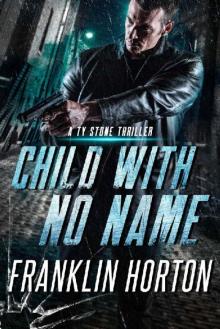 Child With No Name
Child With No Name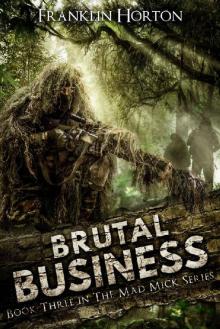 Brutal Business: Book Three in the Mad Mick Series
Brutal Business: Book Three in the Mad Mick Series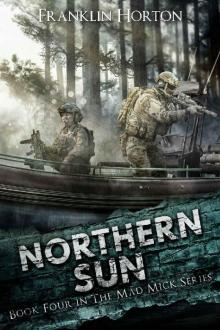 Northern Sun: Book Four in The Mad Mick Series
Northern Sun: Book Four in The Mad Mick Series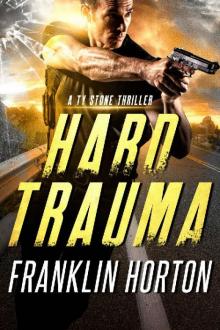 Hard Trauma
Hard Trauma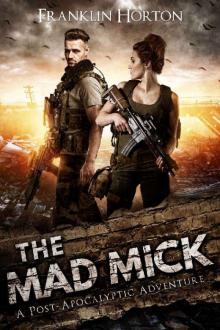 The Mad Mick: Book One of The Mad Mick Series
The Mad Mick: Book One of The Mad Mick Series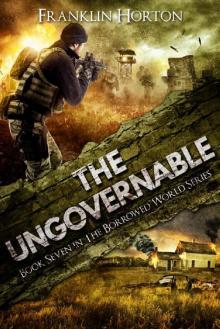 The Ungovernable
The Ungovernable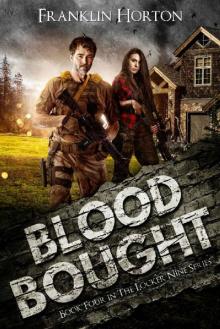 Blood Bought: Book Four in The Locker Nine Series
Blood Bought: Book Four in The Locker Nine Series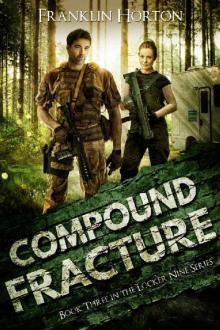 Compound Fracture
Compound Fracture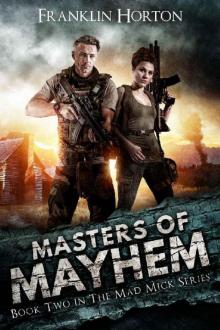 Masters of Mayhem
Masters of Mayhem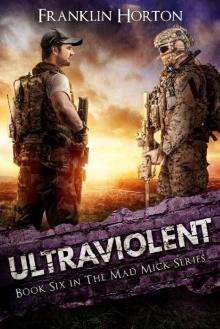 Ultraviolent: Book Six in The Mad Mick Series
Ultraviolent: Book Six in The Mad Mick Series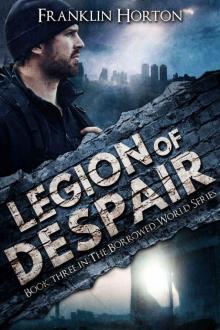 The Borrowed World (Book 3): Legion of Despair
The Borrowed World (Book 3): Legion of Despair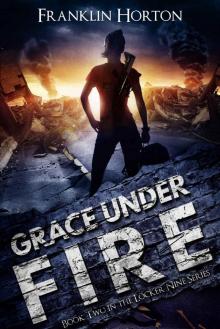 Grace Under Fire: Book Two In The Locker Nine Series
Grace Under Fire: Book Two In The Locker Nine Series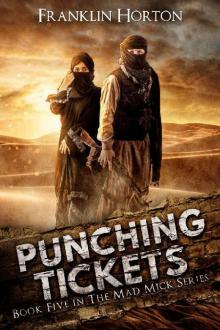 Punching Tickets: Book Five in The Mad Mick Series
Punching Tickets: Book Five in The Mad Mick Series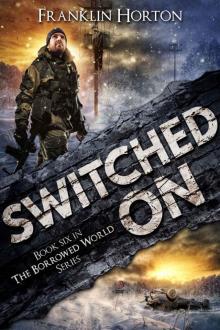 Switched On: Book Six in The Borrowed World Series
Switched On: Book Six in The Borrowed World Series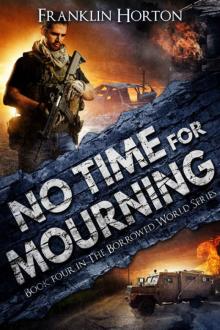 No Time For Mourning: Book Four in The Borrowed World Series
No Time For Mourning: Book Four in The Borrowed World Series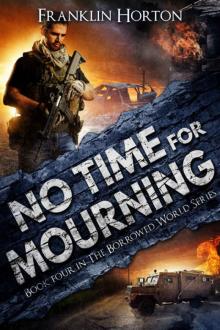 The Borrowed World (Book 4): No Time For Mourning
The Borrowed World (Book 4): No Time For Mourning Random Acts
Random Acts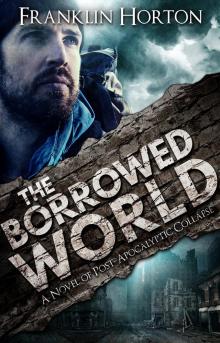 The Borrowed World: A Novel of Post-Apocalyptic Collapse
The Borrowed World: A Novel of Post-Apocalyptic Collapse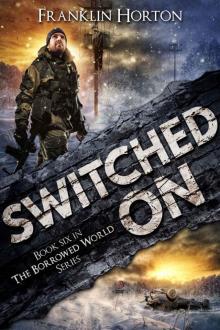 Switched On
Switched On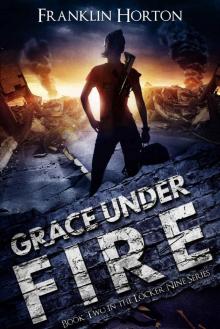 Grace Under Fire
Grace Under Fire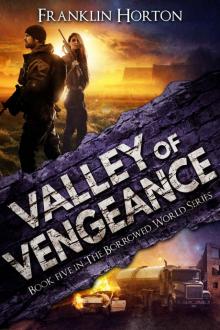 Valley of Vengeance: Book Five in The Borrowed World Series
Valley of Vengeance: Book Five in The Borrowed World Series